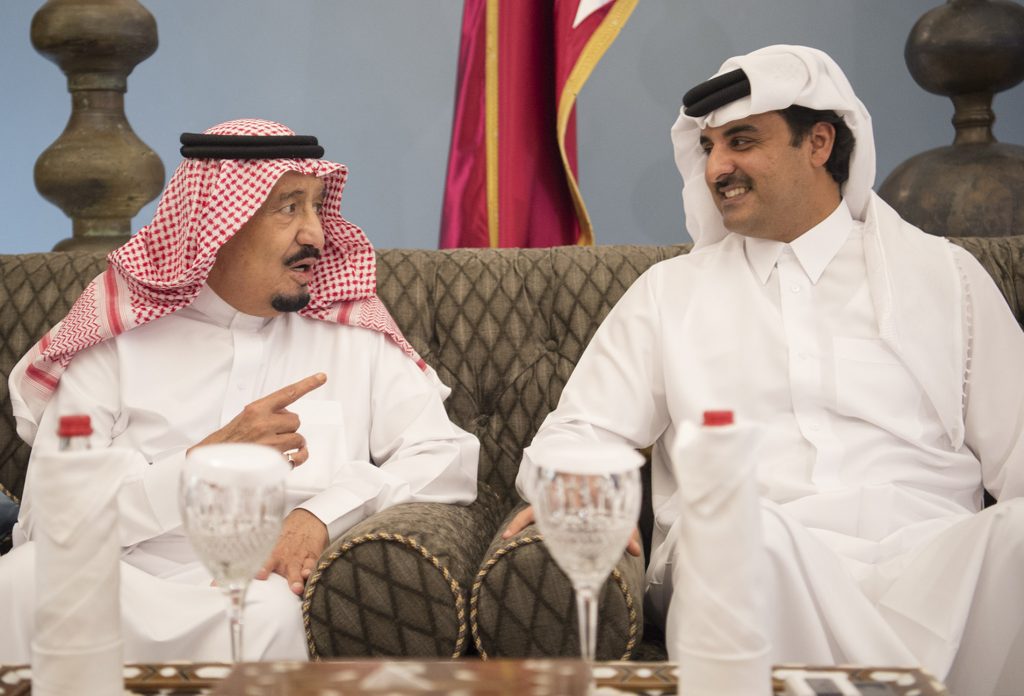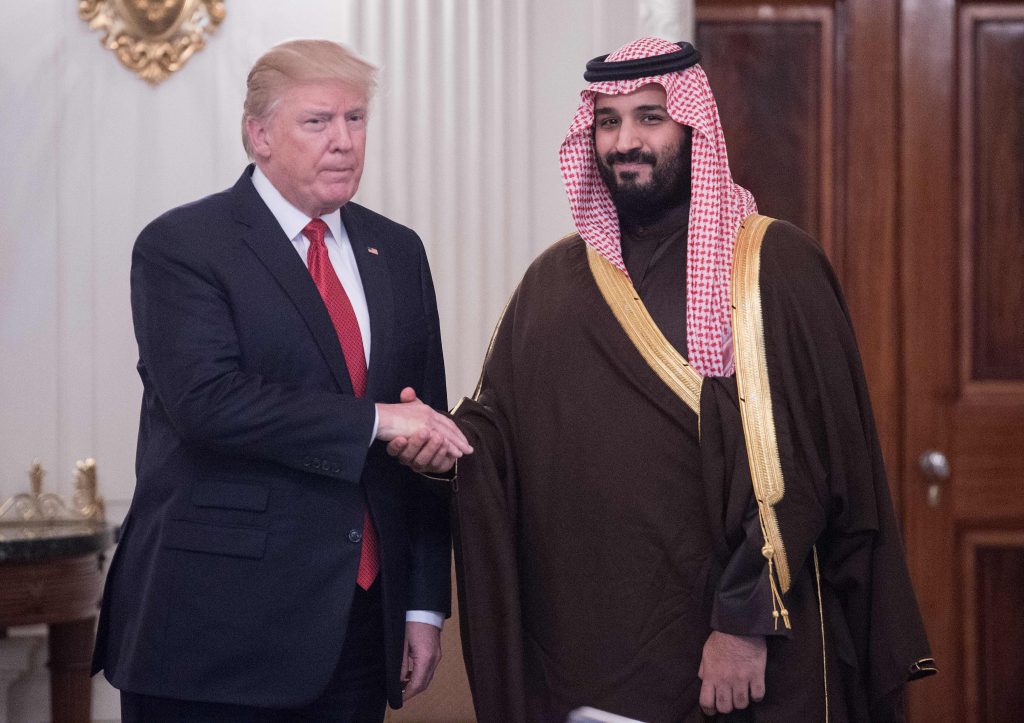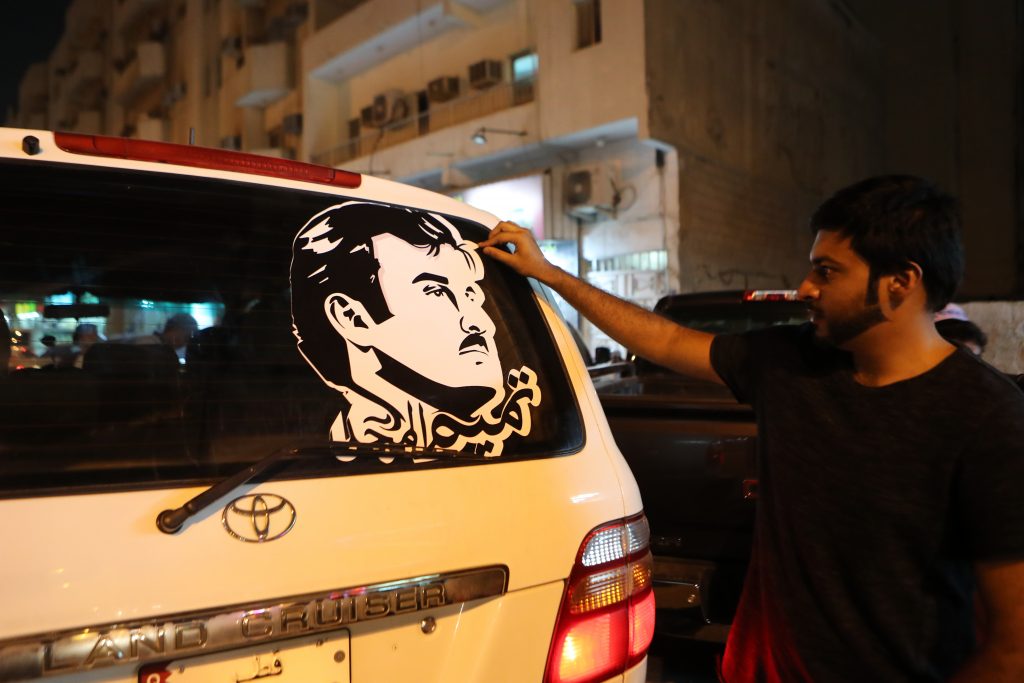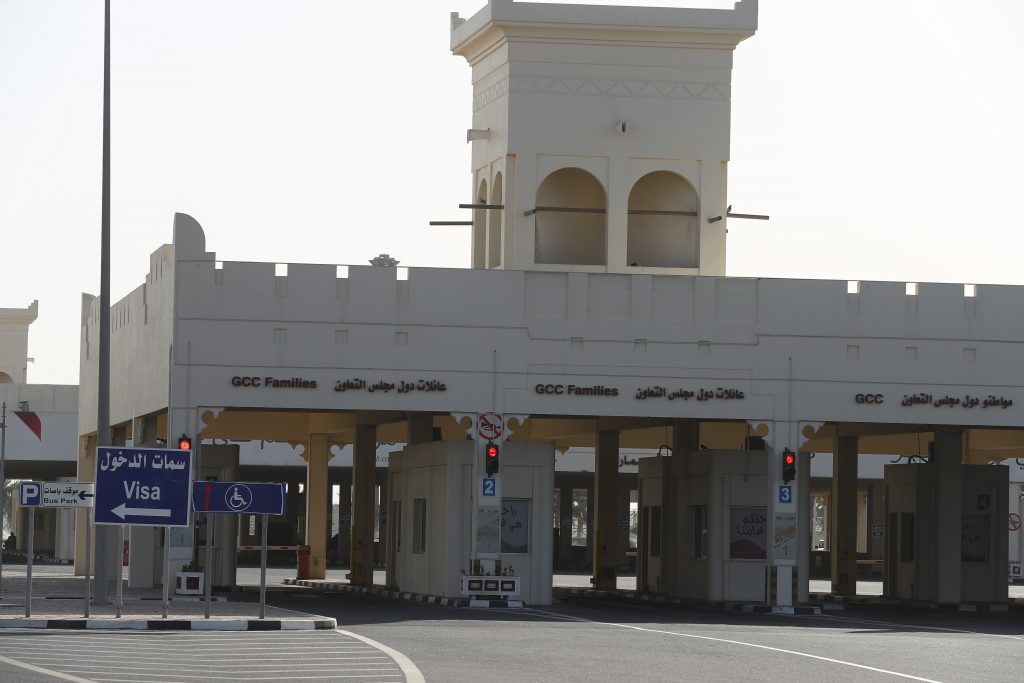The Qatar Conundrum
By Mahir Ali | Newsbeat International | Published 7 years ago

Saudi King Salman (L) chatting with Emir of Qatar
After a bunch of Arab nations, spearheaded by Saudi Arabia and the UAE, broke off relations with Qatar and sealed most of its borders, early last month, Middle East analysts were left scrambling for explanations. After all, none of the reasons officially cited by Riyadh and Abu Dhabi — Doha’s alleged backing of the Muslim Brotherhood, Hamas, Hezbollah and other ‘terrorists’; its relations with Iran; its supposed interference in affairs of other Gulf states, and so on — appeared to suffice as a plausible cause for urgent action.
David Hearst, a seasoned British reporter and commentator with considerable experience of the Middle East, cited one particularly interesting motive, noting that one of the aims was “not only to silence external opposition, but internal forces as well.” Undoubtedly, silencing the opposition to Mohammed bin Salman from within the House of Saud, was a necessary prerequisite for him to be appointed crown prince, in place of his elder cousin Mohammed bin Nayef.
In the event, it took less than three weeks for that part of the mission to be accomplished, taking most observers by surprise. Not because anyone doubted the young man’s ambition or even the power he rapidly accumulated on both the domestic and foreign policy fronts after being named deputy crown prince and defence minister two years ago, at the age of 29, but because it was expected to take longer for Mohammed bin Salman to position himself as the direct heir to his ailing father, King Salman bin Abdulaziz.
However indirect the line between the royal reshuffle in Riyadh and the punishment of Qatar, it is hard to view it as a coincidence. What’s much clearer is that in the wider latter context, things have not been proceeding according to plan — if there was indeed a coherent plan. Even the attempt to co-opt US President Donald Trump as a co-sponsor of the anti-Qatar strategy has been tottering between tweets, with the State Department adopting a rather different line than the White House, and the Pentagon sealing a deal for arms sales worth more than $10 billion to Qatar just days after Trump had parroted the Saudi-Emirati charge describing it as the region’s leading sponsor of terrorism.
On June 19, State Department spokeswoman Heather Nauert wondered why the Gulf states had released no details about their claims more than two weeks after imposing their embargo. “The more that time goes by, the more doubt is raised about the actions taken by Saudi Arabia and the UAE,” she added. “At this point, we are left with one simple question: were the actions really about their concerns regarding Qatar’s alleged support for terrorism? Or were they about the long-simmering grievances between and among GCC countries?”
Intentionally or otherwise, her reference to the Gulf Cooperation Council (GCC) must have touched a sore spot among the Saudis. After all, among the regional group’s six member states, only Bahrain joined the Saudis and the UAE in ostracising Qatar. Kuwait has been leading reconciliation efforts, whereas Oman has not only opted for neutrality, but, alongside Iran, Turkey and even Morocco, has been helping Qatar meet its nutritional needs after Saudi Arabia cut off food trade — which was a particularly shocking thing to do in the middle of the holy month of fasting.
Egypt, Jordan, Libya and Yemen (the latter two notably lack recognisable governments), plus a small bunch of African states reliant on Riyadh’s largesse, went along with the Saudi-UAE action. Iran, on the other hand, has been gifted an opportunity to develop its rudimentary relations with Doha, while the Turkish president, Recep Tayyip Erdogan, has been remarkably outspoken in defence of Qatar, describing its punishment as effectively a death sentence and expressing a willingness to station more troops in the beleaguered Gulf state.
Thus it was that the Saudis wilfully shattered the none-too-convincing image of a united ummah that they had spared no expense in staging just days earlier for Trump’s benefit. What, exactly, was the big idea?

US President Donald Trump and Saudi Deputy Crown Prince and Defense Minister Mohammed bin Salman
The immediate excuse was “provocative” statements — about the Saudi monarch, Trump and relations with Iran — attributed to Qatar’s emir, Sheikh Tamim bin Hamad Al Thani, that appeared in the middle of the night on Qatari news websites. Doha claimed the next morning that the websites had been hacked. An FBI investigation concluded the hackers were Russian — the assumption being they were freelancers funded by sources in the Gulf, rather than Kremlin-inspired. The story has proved impossible for any independent source to verify, but in the wider world the Qatari version is widely viewed as plausible.
Even if the emir had indeed made remarks that some of his GCC neighbours found upsetting, surely recourse to a bout of diplomacy would have been the logical course of action, rather than collective punishment that has created completely unnecessary disruption and disarray. Riyadh and Abu Dhabi have declared that the only solution would be for Qatar to abjectly cave in. But as Doha was pertinently pointing out three weeks after its excommunication, it had, until that point, received no list of demands.
That could be partly because it was never going to be terribly easy for the two main protagonists in the anti-Qatar crusade to honestly spell out what really gets their goat.
Some of the unresolved tensions go back more than two decades to June 1995, when Tamim’s father, Hamad bin Khalifa, deposed his own father, Khalifa bin Hamad, and chose a more dynamic trajectory for the tiny nation state — thanks in large part to Qatar’s huge gas reserves and the burgeoning market for liquefied natural gas Between 1995 and 2014, the Qatari economy made a monumental leap, growing from $8 billion to $210 billion.
A substantial proportion of its money has gone into establishing its clout and spreading its influence both within the Middle East and internationally, with huge investments in Britain and elsewhere in Europe. Large amounts of cash are rumoured to have been involved in securing the 2022 FIFA World Cup for Doha. And when the Arab Spring erupted at the start of 2011, Qatar was openly enthusiastic about the changes — unlike Saudi Arabia, which is always petrified by signs of popular unrest.
Just as they have both liberally funded Wahhabi mosques and other establishments worldwide, the Saudis and the Qataris have on occasion backed the same or very similar Islamist forces in Syria — but as competitors rather than collaborators. Furthermore, the Qataris have been considerably more ecumenical in their approach, at least to the extent of maintaining contacts with all sides (including the Bashar Al Assad regime), which has enabled them to play a role in negotiating the release of hostages, helping to implement ceasefires, serving as a base for mediation (including with the Afghan Taliban) and so on.

A man puts on a car sticker portraying Qatar’s Emir Sheikh Tamim bin Hamad Al-Thani
One of the earliest signs of exerting soft power in this phase of Qatar’s development came with the establishment of the satellite TV network Al Jazeera, which has proved enormously influential in the Arabic-speaking world. It has been the target of complaints from Qatar’s Gulf neighbours and various other states since its inception, in a region that was back then unaccustomed to Arabic-language media that did not faithfully toe the official line. As an extra-territorial novelty, Al Jazeera enjoyed sufficient leeway — and possibly even encouragement from the amused Al Thani clan — to report what had hitherto been considered unreportable and, likewise, say the unsayable. Not surprisingly, it became something of a bete noire for the Americans post-9/11 (it was, after all Al Qaeda’s channel of choice for releasing the latest Osama bin Laden videos), especially after the invasion of Iraq. During the Arab Spring, it was seen as supporting the Muslim Brotherhood in Egypt, and has borne the brunt of Abdel Fattah El Sisi’s wrath ever since he overthrew the elected government.
It is therefore telling, but not terribly surprising, that when Saudi Arabia, the UAE, Bahrain and Egypt finally issued Qatar with a list of demands on June 23, No.3 was the insistence that it shut down Al Jazeera and all affiliates, followed by a list of other news outlets, including Middle East Eye and Al Araby Al Jadeed.
On top of the list was the demand that Qatar end effectively all relations, apart from restricted commerce, with Iran. Then Qatar is called upon to sever all links with “terrorist organisations”, from Islamic State (IS) and Al Qaeda to the Muslim Brotherhood and Hezbollah, and formally declare them terrorist groups. Military relations with Turkey are also verboten. What’s more, Qatar must have no truck with dissidents from any of the dictatorships making these demands. It is called upon to pay reparations for the damage it has already allegedly wreaked, “align itself with the other Gulf and Arab countries militarily, politically, socially and economically,” and agree to do all this — and more — within 10 days.
The most humiliating demand is left for the last: Qatar must consent to monthly “audits” for a year, quarterly for the next year, and annuallyfor a decade thereafter.
In other words, Qatar must cede its sovereignty. That is the price to be paid for challenging Saudi hegemony.
Predictably, Qatar has refused to cave in to the ridiculous demands, which have been designated as untenable by both the US State Department and the UK Foreign Office. At the same time, it has demonstrated a willingness to negotiate. But the Saudis and the UAE are in an uncompromising mood: there has been talk of further sanctions, and even the prospect of the two states suspending commercial relations with any trade partners that continue to pursue business with Qatar. Meanwhile, both Riyadh and Abu Dhabi are bound to be alarmed by a statement from Bob Corker, chairman of the US Senate’s Foreign Relations Committee, that he would withhold consent for all arms sales to the Gulf unless there is a “path forward” to resolving the crisis.

The Qatari side of the Abu Samrah border crossing with Saudi Arabia
That path remains obscure, but earlier last month a Saudi blogger who calls himself Mujtahidd, whose previous Twitter posts have often proved accurate, tweeted about a plot for regime change in Doha spearheaded by Blackwater and UAE forces, replacing the incumbent with a more compliant member of the ruling clan. What complicates matters, of course, is the region’s largest US base (which Trump might have been unaware of when he claimed credit for the Saudi-led verbal, diplomatic and economic assault on the emirate). The longstanding Middle East correspondent Robert Fisk noted last month that he once asked Qatar’s previous emir, Hamad bin Khalifa, “Why he didn’t kick the Americans out of Qatar,” to which the sheikh responded: “Because if I did, my Arab brothers would invade me.” No wonder the UAE has been lobbying hard for the US to shift its base.
A number of international media outlets, meanwhile, have expressed their disgust at the idea of Al Jazeera being strangled. The network’s initial success, mind you, was inadvertently facilitated by none other than Saudi Arabia, when it put the kibosh on BBC Arabic TV, thereby providing the struggling Al Jazeera with a workforce of BBC-trained journalists.
At the time of writing, it is hard to envisage the shape of a conciliatory compromise that might resolve the crisis into which Saudi Arabia and the UAE (intriguingly, Fisk and others have suggested that Dubai is not half as keen on alienating Qatar or Iran as Abu Dhabi) have tipped the region. There are realignments already taking place.
Ultimately, though, the entire Gulf — including Qatar — is run by despots whose ancestors were rewarded for sucking up to Britain when it was a colonial power (until the 1970s, in some cases). Eventually, they will all be dethroned. No one can say how long that will take, but Saudi Arabia (whose former crown prince, Mohammed bin Nayef, is reportedly under house arrest) and the UAE (whose president, Khalifa bin Zayed, has been invisible during his younger brother’s machinations) may just have contributed to accelerating the process.
Mahir Ali is an Australia-based journalist. He writes regularly for several Pakistani publications, including Newsline.


